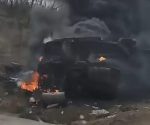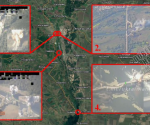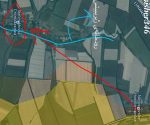British volunteers in Syria; Part One: The dirty little secrets
When the Turkish military Operation Olive Branch began, the British corporate-media took up a peculiar perspective. They started reporting on the possibility of the Turkish push into Afrin being opposed by volunteers from the UK (and other western countries). There was a dribble that turned into a flood – and FBEL was there to notice it first squeeze out of the ground at source, and remarked upon it:
If it ever happens, is the British Government really going to tell the public that “British citizens” were killed by the Turks in Operation Olive Branch? To be frank, the British Government wouldn’t tell the public of a death in the first instance – but then, it can’t control information like it did in the old days. That is why this piece of writing looks like preparation; it looks like setting up for plausible deniability.
The first note was soon turned into a cacophony; US corporate-media also ran stories of UK civilians and their prospects in Syria. The subject is worthy of some analysis, especially as the SDF’s Syriac Military Council has announced it is sending its fighters as reinforcements into Afrin. The Syriac Military Council has a lot of westerners in its ranks, apparently. How interesting things could be if these ranks bristled with serving armed forces personnel from NATO countries – principally the UK and the US? The British Government is a scrawny, scummy and mangy animal; but the British public routinely cannot see the hairless, scabby skin that would make it determine that a wrung neck would be completely necessary, and an act of kindness. Maybe if the really dirty little secrets ever got out – for instance: who actually wages war in Syria, and who actually pays for it – then scales might fall from eyes. But then, even the most unpredictable of corporate-media isn’t going to claim such a scoop, even if it walked up to them and announced itself. Take Fisk (for whom there is no love at FBEL) in Afrin, for instance.
I was thus a little shaken in one small village to see a pick-up load of black-uniformed gentlemen, all holding automatic weapons and with black bandanas around their faces – the words “no photos” were uttered immediately – driving at speed towards the Kurdish-Turkish front line.
“No photos”. Perhaps it is not enough to determine if it was English of a sort to be too good to come from a foreigner. Fisk would have had more to work on – the accent for instance – but he would never tell.
The corporate-media is sprinkled liberally with mentions of British Special Forces in the region. Even in its coverage of civilian volunteers, it can’t help but mention an official British military presence. A Guardian article writer, wanting to compare levels of professionalism between the YPG and the peshmurga in northern Iraq, reminds its audience that “British Special Forces are based in that part of Kurdistan”. They could never be in the Syrian part, mind, and not even as dead men, because that would be an admission of war crime.
Thank goodness, then, for the hapless British volunteers and the barrels of plausible deniability that they generate. Most of these are evidently cannon fodder too – suckers with the shelf-life of a few months before they croak (four out of the seven British volunteers dead in Syria since 2015 had no previous military experience – and expired quickly). Others are evidently there to do an important job, interpret, or propagandise in place of a largely absent corporate-media. Some of them are probably not even volunteers. In this article, we are mostly going to look at the Syrian careers of the “ex-forces” “volunteers”.
Joshua Walker was a student studying “international politics and strategic studies”, Aberystwyth. He went to Syria in the summer of 2016, leaving in December 2016. It appears he served as translator “to help other volunteers integrate into the militia forces, made up of Kurdish, Arabs, Western volunteers and the Syriac Military Council”. Walker is a particularly interesting case because he actually told a British court that he worked with US “special forces”. Not in Iraq, be sure to note. He was in Syria with the YPG.
Now, Walker was in court because, like most of his volunteering buddies – if they make it home to the UK – was picked up and questioned by counter-terrorism “forces”. The author suspects that this is debriefing disguised as a police investigation. In any case, with Walker, things went a bit further because of his being in possession of what the anti-terror “forces” would deem training material: a certain book. Hence his appearance in court – which all involved seemed to have thought should not have happened; i.e. the Crown Prosecution’s case was so weak, it never ever should have been pursued. The judge all but laughed it out of his courtroom. One has to wonder just why a charge that had no hope of sticking was taken all the way to a judge. It has happened in the past, but this instance could be all about going an extra mile to keep up appearances. Because there are some questions that remain unanswered – like how was Walker recruited? He obviously had a specific skill-set that was required on scene; how did the YPG, or its associates in the British military more likely, know about it and get hold of him? Was there anything in his career history that would have enabled this? He was 27 in 2017. The corporate-media is conveniently vague, but it appears that Walker’s stint in Syria interrupted his studies. He didn’t graduate from school into university – the usual career pathway for drones who can do a bit more than spell their names and tie their shoe laces. We don’t know what he did before that. Where did he learn his Arabic?
Konstandinos Erik Scurfield died fighting ISIS in March 2015 – and before proceeding further into his Syrian career, it needs to be said that while ISIS was manufactured and is organised by the USA as a psyop for rationalising the expansion of Kurdish controlled areas in Syria – as has been explicated elsewhere at FBEL – it will be comprised of compartmentalised fighters who might be imported mercenaries, or local tribesmen who will turn-coat for more money or to be on the winning side (hence the propensity for the Arab contingent of the SDF to be ex-ISIS). ISIS is rebranding of that gaggle of guns for hire that was assigned by the USA with the initial task of overthrowing the Syrian Government in a straight fight. It failed. Up to a certain point, ISIS has a life of its own, but after that it will obey its US master. The author suspects that British and US Special Forces even form a super-strata of its command level – this would explain the helpful US helicopter airlifts for certain ISIS members who have found themselves in a tricky situation.
Scurfield died at the very start of March, 2015, in a place called Al-Hol (or Al-Hawl)†. The author can find two references to named operations that took place around this town. There is one known as the 2015 Al-Hawl offensive – in which a major objective appears to have been an oilfield – and the one known as the 2016 Al-Saddadi offensive, which appears to have followed on from Al-Hawl. Both happened after the death of Scurfield, of course, which makes Scurfield’s presence in Syria contemporaneous with the start of the Kurdush push away from Kobane – so, pretty much as the ISIS pysop was beginning to be utilised for its intended purpose. It must be noted that in 2015, the SDF also clashed with forces loyal to the Syrian Government, and we especially need to note the manner of the final ISIS capitulation which left the “ISIL capital city of Raqqa as the only major ISIL stronghold near SDF-held territories in northeastern Syria” (from the Wikipedia page linked-to above):
ISIL’s sudden collapse in al-Shaddadi was described as “swift and surprising,” and the withdrawal was thought to be due to ISIL’s tactical reasoning or an attempt to alarm Turkey with rapid Kurdish advances. In late March 2016, US officials revealed that the Al-Shaddadi offensive had originally been planned as a 6-week-long operation, but instead, ISIL forces there collapsed within days.
How about the withdrawal was due to the importance of protecting ISIS high command from death; there never was any intention of delivering more than a show of fighting the YPG?
But back to Scurfield. He was described in corporate-media as a former Royal Marine, but there is a problem with this. What is wrong with the following sentence from the Guardian’s reportage?:
Scurfield is understood to have been with 45 Commando based in Plymouth for about two years before travelling to Syria earlier this year [2015].
Maybe what’s wrong is the fact that, usually, a Royal Marine must serve a minimum of 3 years before giving 12 months notice to leave. Training is 32 weeks in duration (so, 7 to 8 months), and then there is deployment to a Commando infantry unit – 45 being one of them. We are told that Scurfield signed up at the age of 21 – having died aged 25, this looks like a four year intervening period which the usually dozy Guardian audience would let pass its attention. But signing up is surely reference to enlisting. There is much to do after that even before a mug gets to join. However, even if it is possible for Scurfield to have served his minimum stint, the obvious question to ask is this: – why resign from the Marines to immediately then become a fighter in Syria?
The Guardian must have anticipated this, and made a point of writing a rationale for Scurfield’s actions (all that bother for one man), and it runs along these lines:
Many ex-soldiers eventually make the difficult transition into civilian life. Others never make it, ending up depressed, alcoholic and out in the streets. And a few, missing the excitement and the camaraderie, head off to other parts of the world, to take up arms again in someone else’s war.
The former Royal Marine Konstandinos Erik Scurfield went off in December [2014] to join the Syrian Kurdish YPG, one of the groups fighting against Islamic State (Isis).
First of all, please do notice that there is not a consistent date for when Scurfield was meant to have joined the YPG. Besides that, the real point is that we are evidently supposed to understand that Scurfield, having just resigned from the Marines, coped with being an ex-serviceman by travelling to Syria to fight ISIS. The Guardian piece stretches the bounds of credibility by suggesting that Scurfield was attracted to the social justice principles of the YPG’s politics – highfalutin’ stuff indeed for grunts. Of course, all is possible – but is it also possible that what we have here, hiding in plain view, is a case of an active serviceman also fighting with the YPG? By the way, the Guardian piece about Scurfield’s death contained many tributes paid to him by US “citizens” who were with him in the “Lions of Rojava” unit. Maybe these were the sort of chaps that Walker was referring to when he spoke of American “special forces”.
Next we turn to the case of Joe Robinson. This fellow had been in the Duke of Lancaster regiment, serving with them in Afghanistan, 2012. Robinson is an unusual case. The official reason for his going to Syria is that he didn’t show at a court hearing, and a warrant was issued for his arrest. Not being able to change his luck, in 2017 he was picked up by Turkish police as he was holidaying “in the town of Didim, about 62 miles (100km) north of Bodrum, south-west Turkey”. Unfortunately, Joe didn’t think things through when he decided to spend his vacation with his Bulgarian girlfriend and mother-in-law in the land where the YPG is a criminal entity: for Joe had previously spent the height of the summer of 2015 in Syria as a “combat medic” with the People’s Protection Units of Syrian Kurdistan.
According to the Hurriyet daily, the Briton said in his statement to police investigators that he spent three months in Syria providing medical assistance to the YPG.
Hopefully, the Turkish investigators don’t read the Guardian, where we discover that at one time Joe “crossed the border to join the peshmerga”. As did a friend of Joe’s: Tim Wordsworth. On the surface, this unsavoury character was disappointed that he hadn’t fired a shot in anger during the course of his army career – that, and his desire for vengeance for the “slaughter of thousands of Yazidis by ISIS in August 2014”, were the motivating factors for his going to Syria. Wordsworth appears to be the sort who would be a genuine mercenary (and if he was paid – one way or another – and not just doing the “job” out of love, we might get a clue about the paymaster later).
He told MailOnline: ‘I had a great time in the Army, it was such a supportive organisation… but I never had to fire a shot at the enemy during the whole of my four years. And of course I longed for professional fulfilment.
‘To be a rifleman is pretty much everything and so I had a big hope in myself that I would do the job of a rifleman that I was trained for and I got to do that job in Syria and Iraq against an evil enemy. It was years and years of being a civilian and thinking I’ll never really be a rifleman.’
Evidently, these days there isn’t any difference between being a soldier in the British Army, answerable to the People and therefore compelled to be a moral actor on a battlefield, and being a member of a rag-tag brigade that urinates on the bodies of its dead enemy. (But then again, why should there be any difference; the Queen’s mercenaries never did answer to the People). Don’t forget, folks, come the day you find the Army on the streets; professional fulfilment for a soldier is getting to put a bullet in a human being.
What is interesting about this account is that it didn’t come out till 2017. Wordsworth talks of Joe Robinson (“a lovely young man” – interesting, considering Robinson once broke a man’s jaw in a bar fight) , and one wonders if it isn’t, in part, to raise awareness about his plight in Turkey, because the author notices a “Free Joe” campaign brewing. In actual fact, the above statement is incorrect, for there was some interest in Wordsworth in 2015 – and “the Zionists did it” mob will love this – in Israel: Meet the Hasidic-slogan-tagging Jew fighting in Syria announces the headline in a YNetNews article, which goes on…
In a special interview to Ynet, Batn El Ghoul, also known as Timothy Paul Jacobs Wordsworth, tells the story of how a British man ended up tagging the walls of former ISIS positions in Syria with Breslov Hasidic chants…
10 years ago he made his dream a reality and visited Israel, believing he could become an Israeli citizen without too much fuss, however things didn’t work out like he planned: “I asked for Israeli citizenship, but I was deported from Israel in 2005 because my visa had expired,” he says. “Because I grew up as a Christian in a Christian family, I couldn’t make aliyah through the law of return, although with god’s blessing I will be able to return to Israel this year, because my 10 year entrance ban expires soon.”
…Jacobs-Wordsworth tends to close every sentence with “Am Israel Chai,” and Rabbi Nachman from Uman stars in many of his Facebook posts. But he does admit that his beliefs are somewhat complex: “I believe that there were two messiahs, as it is written in the Talmud: The messiah Ben Yossef, and the messiah Ben David. I believe that Ben Yossef was already here, and his name was Jesus. I believe that the messiah Ben David will come soon.
“I plan on filling a request to make Aliyah again,” Jacobs-Wordsworth says, and adds that he has undergone a Reform Judaism conversion in London a few years ago. “I am a member of the North Western Reform Synagogue in London,” he said.
Perhaps we begin to see that it isn’t the desire for professional fulfilment that drives a man to go to fight in and for Kurdistan. The author joked about “the Zionists did it”, but sometimes they are responsible.
Next we turn to the case of Kevin Benton. Formerly of the Royal Regiment of Scotland for four years, serving in Afghanistan and Sierra Leone, Benton spent most of 2017 in Syria and with the YPG – and in particular, in Raqqa. The following is from a Daily Record article, which quotes Benton extensively:
I just joined them as a bod – I wasn’t going to do anything special – but then I saw them training and thought they were guys who were going to die.
I stepped up and helped with the training – how to clear rooms properly, how to approach a building, how to scan your horizons, medical training, how to drive – all things I learned through the Army and close protection.
None of the guys there were soldiers, they were just people who cared.
Here’s the problem. Benton arrives in Syria, and notices that the YPG training won’t cut the mustard, and so he steps up to make everyone into battle-worthy SOBs himself? How did the SDF ever manage before that? Wikipedia says that “as many as 500 US special forces… [operated in northern Syria] in support of the Raqqa campaign” – the Raqqa campaign being the general effort to capture the city that started in November 2016. How was it that the YPG was suddenly incompetent with all those big-man warriors in their midst?
One can’t help but notice that Benton arrived in Syria in the build up to the assault on Raqqa itself (around February or March 2017 – we know he returned to the UK in October 2017, and was in Syria for eight months). We can imagine that on face value the attempt to take Raqqa, a big town of quarter of a million people, would involve a different sort of fighting than would have been executed in the countryside around it – Benton talks about this himself when he mentions clearing rooms and approaching a building. To be cynical about it, there would be a lot of traps to spring: mines to be stepped on. Put yourself in the shoes of the US military planners, dear reader. Would you expend good American “special forces” on a quagmire that was there for appearances sake? As it turned out, there were plenty of volunteers who would put themselves in harm’s way, but they would need training; “none of the guys there were soldiers”. A high proportion of the British volunteers killed in Syria (to this date) were victims of the Raqqa death trap – but that “dirty secret” is covered in the next article in the series [in fact, the second part is entitled The Chinese social media superstar psyop: to be found here.]
† Tim Wordsworth reports that Scurfield was killed at Tel Khuzela


















